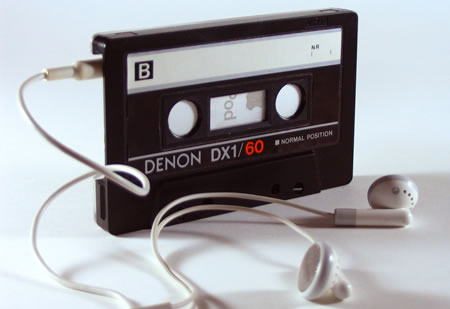Master Dub – Remix of the Workplace
 Friday, March 28, 2008 at 12:08AM
Friday, March 28, 2008 at 12:08AM Guest blogger, June Blanks

In the beginning. . . .
. . .there was vinyl. Then a quick 8 track blip on the radar. Followed by the birth of the cassette tape (hello Walkman!). The evolutionary chain then brought forth compact discs along with its sidekick - the Discman. The next great leap landed us on the subway sitting next to this guy who has an iPod feeding into his ears, cool beat. How did he get here?
In 1999, Napster created a peer-to-peer (P2P) file-sharing program enabling music lovers to grow digital music collections. You've got some + I've got some = Together we have more. The collective idea was simple, explosive and totally ground breaking. Napster harnessed the power of the crowd. They advanced supply and demand for the emerging digital format of music. Where did the multiplication of little white earbuds begin? The evolution of sharing.
Companies are assembling around collaborative environments to crowdsource ideas and energize growth, showing us that together we definitely have more. Bug Labs allows its community to create and modify gadgets to yield inventions that are chameleons for personal desires. Our featured "Links on the Brink" CoolTown Studios uses crowdsourcing as an urban planning tool, cultivating interested focus groups aimed to develop places that further bring communities together. With these tools the world map is sprouting collaborative crops. Collaborative mechanics are alive and growing inside offices as well. Your office is a hotbed of knowledge and interest in the business of your business. Loosening up the top-down attitude can root the foundation of your company in strong and engaged employees. Here's a couple restructuring remixes that can turn your office into a peer-to-peer crop field.
1. Open your door, the President of Hearst Magazines does. In an interview with NPR maven Diane Rehm, Cathie Black responds to an inquiry about being a leader who listens:
Rehm: [As one of the top executives in the publishing world] when you say you have an open door policy, what does that mean?
Black: What it doesn't mean is that people just wandering around the hall come kind of strolling in on a constant basis. I do have a gatekeeper [two assistants]…My calendar is available. I want to generally know, Why does someone want to see me?...I like to know because then I think about, How do we make this productive?
2. Tear Down the Walls or Build Without Them. Keep your door if you must boss, but consider how your colleagues relate to each other on a day-to-day basis. Design firms have relied on the creative energy flowing through a practically wall-less office for years. Co-workers engage each other, encourage strong elements of projects, and help redirect projects that are getting stuck. Everyone is more productive and bad ideas get weeded out earlier.
Elkus Manfredi Architects describes the many benefits of community regarding their design for international consulting firm Towers Perrin: "Glass throughout transmits natural light to interior areas. While perimeter offices, and open workstations predominate, glass-fronted conference rooms, multipurpose rooms, and café areas create natural gathering places that strengthen the sense of community. The design message is clear – this is an exciting and comfortable space to work in, and Towers Perrin is a dynamic, forward-thinking leader in its field."
3. Eat With Your Crops, Meet With Your Crops. The staff at Smithsonian Books lunch together frequently, giving them time to stay connected, pollinate ideas, put everything on the table, and hammer out book after book. Discussing things in a non-office setting really opens doors. Editor Christina Wiginton contributes that it is "important for the more experienced people in these half social/half business meetings to ask others direct questions to draw them out, ask directly for input, and create an atmosphere where contributions are valued."
Threshold collaborates with CoolTown Studios' brainpower: "Think of your district [office] as an encyclopedia, full of resources and places to see. However, no one's using an encyclopedia anymore; they're all on the crowdsourced Wikipedia." Get your creative juices flowing for the remix, and reinvent your workforce collective.


Reader Comments